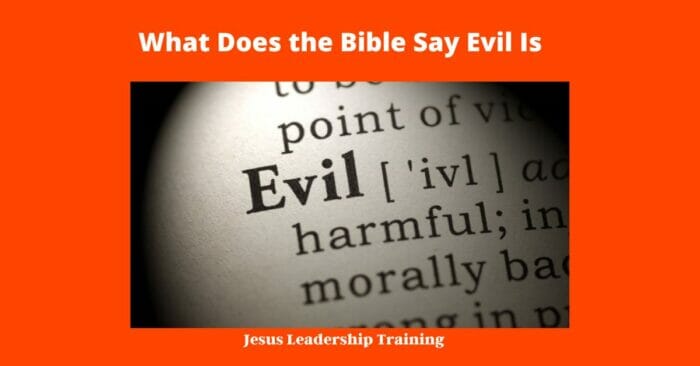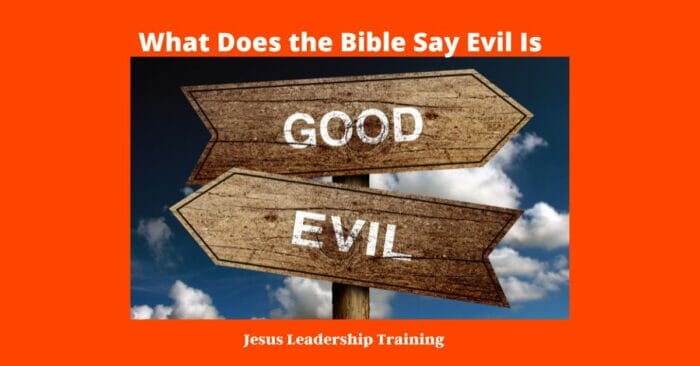What Does God say about Evil – The Bible describes evil as anything that goes against God’s will or goodness. It is defined as an immoral act that is contrary to God’s law. In the Bible, evil is identified as sin, which is a violation of God’s will and righteousness. Scripture makes it clear that God is holy and perfect, and evil is anything that goes against His character. The Bible states that “evil reports are not from the Lord” (Proverbs 16:33).
Table of Contents
What Does God say about Evil
here are some bullet points summarizing what God says about evil in the Bible:
- God is Absolutely Good: The Bible affirms that God is inherently good, and there is no evil in Him. (Psalm 25:8; James 1:13)
- God Hates Evil: God detests evil and wickedness. (Proverbs 6:16-19; Psalm 97:10)
- The Origin of Evil: Evil is not created or caused by God. It originates from the disobedience of created beings, particularly Satan’s rebellion against God. (Isaiah 14:12-15; Ezekiel 28:12-17)
- Free Will and Accountability: God has given humanity free will, which can lead to both good and evil choices. People are held accountable for their actions. (Joshua 24:15; Romans 14:12)
- Consequences of Evil: The Bible teaches that evil actions have consequences, and God will judge evildoers. (Galatians 6:7-8; 2 Corinthians 5:10)
- Overcoming Evil: Believers are encouraged to overcome evil with good, love their enemies, and not repay evil for evil. (Romans 12:21; Matthew 5:44-45)
- Spiritual Warfare: The Bible acknowledges the existence of spiritual forces of evil, including Satan and demons. Believers are called to put on the armor of God to stand against these forces. (Ephesians 6:10-18)
- Redemption and Forgiveness: God offers redemption and forgiveness to those who repent and turn away from evil. (1 John 1:9; Acts 3:19)
- Victory Over Evil: The ultimate victory over evil is promised in Scripture, with the defeat of Satan and the establishment of God’s eternal kingdom of righteousness. (Revelation 20:10; Revelation 21:4)
- God’s Sovereignty: While evil exists, God remains sovereign and can work all things for good according to His purposes. (Romans 8:28)
- The Cross: The death and resurrection of Jesus Christ on the cross provide the means for the forgiveness of sins and the triumph over evil. (Colossians 2:13-15; 1 Peter 2:24)
- God’s Love and Mercy: Throughout the Bible, God’s love and mercy are emphasized, offering a way for people to turn from evil and find forgiveness and reconciliation. (John 3:16; Psalm 103:8-12)
- End of Evil: The Bible prophesies the ultimate judgment of evil and the renewal of creation, where there will be no more evil or suffering. (Revelation 21:1-5)
These bullet points highlight various aspects of how God addresses and relates to evil in the context of human choices, spiritual warfare, redemption, and His ultimate plan for the future.
This verse indicates that any report or action that goes against God’s will is considered evil. The Bible also states that “there is no evil in the sight of the Lord” (Deuteronomy 32:4). This verse emphasizes how God does not approve of any form of evil. In the Bible, evil is associated with wickedness, immorality, and unrighteousness. It is also associated with the devil and sin. The Bible states that “there is no one who does good, not even one” (Romans 3:12). This verse emphasizes the fact that all people have sinned and have committed some form of evil.
What Does the Bible Say Evil Is
The Bible is full of stories and teachings about good and evil. God is the ultimate source of righteousness, and evil has its origins in the rebellion of man against God. The Bible teaches us that evil is real, and it is something to be resisted with all our might. It is a force that is always lurking and ready to work its destructive influence in our lives. But the Bible also provides hope, reminding us that in the end, good will prevail and the power of evil will be broken.
What the Bible Says about Evil
The Bible teaches us that evil is real and something to be taken seriously. In the Old Testament, God tells us that “evil shall not be allowed to dwell in your midst” (Deuteronomy 13:5). The New Testament also speaks against evil, as in 1 Corinthians 10:13, which says, “No temptation has overtaken you but such as is common to man; and God is faithful, who will not allow you to be tempted beyond what you are able, but with the temptation will provide the way of escape also, that you may be able to endure it.”
Steps How the Bible Says to Avoid Evil
- Reject evil: The Bible is clear that evil must be rejected. In James 4:7 it says, “Resist the devil, and he will flee from you.” This means that we must actively turn away from anything that goes against God’s will.
- Pray: Prayer is an essential tool in avoiding evil. In 1 Thessalonians 5:17 it says, “Pray without ceasing.” This means that we should be continually talking to God and asking for His help and protection.
- Meditate on God’s Word: Psalm 1:2 says, “But his delight is in the law of the Lord; and in his law doth he meditate day and night.” This means that we should read and think deeply on the Bible throughout the day.
- Obey God’s commands: The Bible is full of commands that we are to obey. In Deuteronomy 6:17 it says, “You shall diligently keep the commandments of the Lord your God, and his testimonies and his statutes, which he has commanded you.” This means that we must be willing to obey God’s commands no matter what.
- Abide in Christ: In John 15:4 it says, “Abide in me, and I in you.” This means that we must stay close to Jesus and make Him the center of our lives.
- Put on the armor of God: In Ephesians 6:10-18 it talks about putting on the armor of God. This armor is a spiritual protection that helps us to stand against evil.
- Walk in the Spirit: In Galatians 5:16 it says, “Walk in the Spirit, and you shall not fulfill the lust of the flesh.” This means that we must stay in tune with the Holy Spirit and allow Him to lead our lives.
- Be filled with the Holy Spirit: In Ephesians 5:18 it says, “And be not drunk with wine, wherein is excess; but be filled with the Spirit.” This means that we should be filled with God’s Spirit so that we will be able to have the strength and power to resist evil.
- Put away bitterness and wrath: In Ephesians 4:31 it says, “Let all bitterness, and wrath, and anger, and clamour, and evil speaking, be put away from you, with all malice.” This means that we must get rid of any negative emotions that can lead us down the wrong path.
- Love others: In 1 John 4:20 it says, “If a man say, I love God, and hateth his brother, he is a liar: for he that loveth not his brother whom he hath seen, how can he love God whom he hath not seen?” This means that loving others is an essential part of avoiding evil.

Bible Verses about Evil
The Bible provides many verses on evil. In Psalm 37:1-2, the psalmist writes: “Fret not thyself because of evildoers, neither be thou envious against the workers of iniquity. For they shall soon be cut down like the grass, and wither as the green herb.” In Proverbs 16:27-29, we read: “An ungodly man diggeth up evil: and in his lips there is as a burning fire. A froward man soweth strife: and a whisperer separateth chief friends. A violent man enticeth his neighbour, and leadeth him into the way that is not good.”
Evil in the World: Examples
The Bible speaks of evil in many different forms. In the Old Testament, we see examples of evil in the form of idolatry and false religions, as well as in the form of oppression, injustice, and violence. In the New Testament, we see examples of evil in the form of false teachings, hatred, and other sins. In both Testaments, we also see examples of God’s people fighting against evil and ultimately triumphing over it.

Understanding Evil in the Bible
The Bible provides us with a clear picture of what evil is, why it exists, and how to fight against it. Evil is anything that goes against God’s will and His commandments, and it is a force that seeks to destroy us. We are called to fight against evil in our own lives, and in the world around us. The Bible teaches us that God will ultimately vanquish evil, and that we should strive to be agents of His will by combatting evil in any way we can.
How the Bible Says to Escape From Evil
- Pray – Prayer is the foundation of any spiritual activity and the first step in overcoming evil. The Bible encourages us to pray for protection and strength, and to plead the blood of Jesus over our lives and homes. Pray for spiritual discernment and for God to reveal any strongholds of evil that may be present in your life. (Ephesians 6:18; John 16:33; Hebrews 4:16; 1 John 5:18)
- Put on the Armor of God – Put on the full armor of God, which is a spiritual armor that protects us from the evil forces in spiritual warfare. This armor includes the belt of truth, the breastplate of righteousness, the shoes of peace, the shield of faith, the helmet of salvation, and the sword of the Spirit. (Ephesians 6:11-17)
- Be Spiritually Minded – Be spiritually minded and focus your thoughts on God, His Word, and His promises. Fill your mind with positive, uplifting thoughts and scriptures that will help renew your mind and strengthen your faith. (Romans 12:1-2; Philippians 4:8)
- Avoid Sin – Avoid the temptation to sin, as this will only open the door to further evil in your life. If you are already in sin, humble yourself before God and repent. (Romans 6:12-14; James 4:7)
- Put on the Whole Armor of Light – Put on the whole armor of light, which is the armor given to us by Jesus that will protect us from the darkness of evil. This armor includes the belt of truth, the breastplate of righteousness, the shoes of peace, the shield of faith, the helmet of salvation, and the sword of the Spirit. (Romans 13:12-14; Ephesians 6:11-17)
- Put On the Garments of Praise – Put on the garments of praise, which is a spiritual weapon that will help to drive out the evil forces in spiritual warfare. Praise the Lord for His goodness, His power, and His authority over evil. (Isaiah 61:3; Psalm 149:1-5)
- Bind the Enemy – Bind the enemy and his plans to destroy your life in the name of Jesus. Do this by declaring God’s Word and speaking out loud the promises of God that will break any strongholds of evil. (Matthew 16:19; Luke 10:19)
- Obey God – Obey God’s commands and live in obedience to His Word. This will enable you to stay away from the traps of the enemy and keep your focus on God. (1 John 2:3-4; John 14:15)
- Renew Your Mind – Renew your mind by meditating on God’s Word and filling your mind with scriptures that will help you stay focused on God. This will help you stay away from the traps of the enemy and keep your focus on God. (Romans 12:1-2; Philippians 4:8)
- Put On the Helmet of Salvation – Put on the helmet of salvation, which will help protect you from the attacks of the enemy. Pray for God to fill your mind with His Word and help you to stay focused on Him. (Ephesians 6:17; Isaiah 59:17)
Hebrew Words for Evil
In the Bible, the Hebrew words for evil are “ra” and “raah.” The word “ra” in particular is used to describe an evil or wicked person, or an immoral deed. The Hebrew word “raah” is used to describe an evil or wicked thing, or an evil act. Both words are often used in conjunction with other Hebrew words to describe more specific types of evil.

- Ra’ (רָע): This is the most commonly used word for “evil” in Hebrew. It is used to describe a wide range of wickedness, from moral imperfection to physical harm.
- Rah (רָה): This word is often used to refer to a moral evil or a malicious act. It is sometimes used interchangeably with ra’.
- Sheker (שֶׁקֶר): This word refers to lies, deceit, or dishonesty. It is often used to describe a person or situation that is dishonest, untrustworthy, or false.
- Chamas (חָמָס): This is a very strong word for evil, used to describe extreme violence or destruction.
- Nega (נֶגַע): This word is used to refer to a spiritual or physical affliction caused by evil.
- Ona’ah (עֹנָחָה): This is a very specific type of evil, which refers to taking advantage of someone through deception or fraud.
- Makot (מַכּוֹת): This is a general term for punishments or afflictions caused by evil deeds.
- Ayin Hara (עַיִן הָרָע): This is a very specific type of evil, which means “evil eye” and refers to a jealous, envious, or malicious stare.
- Dibbur HaRa (דִּבּוּר הָרָע): This is a type of evil speech, which is used to slander or insult someone.
- Shav (שָׁוְא): This is a very strong word for evil, used to describe something that is evil, wicked, or immoral.
Greek Words for Evil
- Apistos (άπιστος): This Greek word translates to “unbelieving” or “disbelieving,” and is used to describe someone who is wicked or morally wrong.
- Kakia (κακία): Kakia is the Greek word for “evil,” and is defined as a lack of morality, wickedness, and corruption.
- Phthora (φθορά): This Greek word means “corruption” or “decay,” and is used to describe evil in its most extreme forms.
- Adikia (άδικία): Adikia translates to “injustice” or “wrongdoing,” and is used to describe any moral or legal violation.
- Kakos (κακός): This Greek word means “bad” or “evil,” and is used to describe a person or situation that is undesirable or wicked.
- Kaka (κάκα): Kaka is the Greek word for “evil,” and is defined as a lack of morality, wickedness, and corruption.
- Phthonos (φθόνος): This Greek word translates to “envy” or “jealousy,” and is used to describe someone who is consumed by feelings of spite and malice.
- Poneros (πονηρός): Poneros is the Greek word for “wicked,” and is used to describe someone who is cruel, malicious, and morally corrupt.
- Kakoetheia (κακοηθεία): This Greek word translates to “villainy” or “misconduct,” and is used to describe someone who is morally wrong or evil.
- Poneriasis (πονηρίασις): Poneriasis is the Greek word for “depravity” or “debasement,” and is used to describe the worst forms of evil.
Aramaic Words for Evil
- Ra’ah (רַעַה): This Aramaic word translates to evil, wickedness, or harm.
- Sheqer (שֶׁקֶר): This Aramaic word translates to falsehood, deceit, or lies.
- Aza (עַזָּא): This Aramaic word translates to wickedness, evil, or sin.
- Akhar (עַכָּר): This Aramaic word translates to malice, hostility, or wickedness.
- Amal (עַמָּל): This Aramaic word translates to toil, labor, or work.
- Samchut (שַׁמְחֻת): This Aramaic word translates to sorrow, grief, or sadness.
- Chamas (חָמָס): This Aramaic word translates to violence, destruction, or wickedness.
- Rakiya (רַקִּיעַ): This Aramaic word translates to wickedness, corruption, or evil.
- Chevel (חֶבֶל): This Aramaic word translates to sorrow, grief, or sadness.
- Amayah (עַמָּיָה): This Aramaic word translates to wickedness, evil, or sin.
How to Fight Evil According to the Bible
The Bible provides us with a clear plan of action for fighting evil. We are instructed to put on the armor of God (Ephesians 6:11-17), and to be prepared to take a stand against evil. We are also told to seek God’s guidance, to pray, and to ask for His help to fight against evil. We are also called to be witnesses for God and to share the gospel with others, so that they may turn away from evil and choose to follow God.
Understanding the Nature of Evil
The Bible teaches us that evil is a real and powerful force in the world. It is a force that can enslave us, if we allow it to. However, we must remember that God is ultimately in control and that He is greater than any evil. God has given us the power to resist evil and to choose good instead. We must strive to understand the nature of evil and to be aware of its presence in our lives, so that we can choose to oppose it and stand against it.
Evil in a Nation: Biblical Perspectives
The Bible is full of examples of evil in nations. In Exodus and Deuteronomy, we see examples of God’s people struggling against oppressive nations, and ultimately triumphing over them. In the New Testament, we see examples of God’s people living in a hostile world and struggling against evil forces. The Bible teaches us that evil will always be present in nations, but that God’s people can still stand up against it and fight it.
The Evil Within Man: A Biblical Analysis
The Bible teaches us that the evil within man is something to be taken seriously. In Genesis 6:5, we read, “And God saw that the wickedness of man was great in the earth, and that every imagination of the thoughts of his heart was only evil continually.” The Bible also teaches us that we must resist the evil within us, and that we must strive to be holy, as God is holy (1 Peter 1:15-16).
KJV Bible Verses on Evil
The Bible provides many verses about evil. Here are some of the most well-known verses in the King James Version of the Bible:
• Proverbs 8:13: “The fear of the Lord is to hate evil”
• Psalm 34:14: “Depart from evil, and do good”
• Proverbs 16:17: “The highway of the upright is to depart from evil”
• Isaiah 5:20: “Woe unto them that call evil good, and good evil”
• Ephesians 6:12: “For we wrestle not against flesh and blood, but against principalities, against powers, against the rulers of the darkness of this world, against spiritual wickedness in high places”
Final Thoughts – What Does the Bible Say Evil Is
The Bible is full of teachings about good and evil. It teaches us that evil is real and something to be resisted with all our might. It also provides us with hope, reminding us that in the end, good will prevail and the power of evil will be broken.
The Bible speaks of evil in many forms, such as idolatry, false religions, oppression, injustice, and violence. It also teaches us that we must fight evil by putting on the armor of God, seeking His guidance, and praying for His help. We must also strive to understand the nature of evil and to be aware of its presence in our lives, so that we can choose to oppose it and stand against it.
Best Bible Encyclopedias and Dictionaries
Below is a table featuring some highly regarded Bible Encyclopedias and Dictionaries along with their publishers and websites where they can be found or purchased.
| Title | Publisher | Website |
|---|---|---|
| The International Standard Bible Encyclopedia | Eerdmans | Eerdmans |
| Zondervan’s Pictorial Bible Dictionary | Zondervan | Zondervan |
| Easton’s Bible Dictionary | Thomas Nelson | Thomas Nelson |
| Holman Illustrated Bible Dictionary | B&H Publishing Group | B&H Publishing Group |
| The New Unger’s Bible Dictionary | Moody Publishers | Moody Publishers |
| HarperCollins Bible Dictionary | HarperOne | HarperOne |
| Vine’s Complete Expository Dictionary of Old and New Testament Words | Thomas Nelson | Thomas Nelson |
You can generally find these resources on the publishers’ websites, as well as other online book retailers such as Amazon or Christianbook. It’s always good practice to confirm availability and review additional details on the specific websites or other reliable online bookstores.




